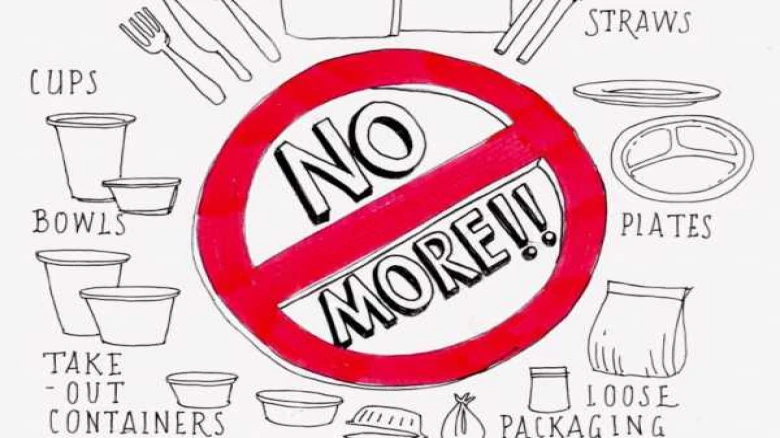Regional

Digital Desk: The ban
on single-use plastic products, such as wrapping or packaging films, plastic
cutlery, straws, and sticks made of plastic for balloons and earbuds, will go
into effect on July 1 even though manufacturer associations have stated they
are not ready to implement it right away due to a lack of alternatives.
"Times New Roman";color:#424242">It will also be forbidden to manufacture,
import, stock, distribute, and sell the items. Beginning on December 31,
plastic carry bags' thickness will increase from 75 millimetres to 120 microns.
"Times New Roman";color:#424242">
"Times New Roman";color:#424242">According to Bhupender Yadav, minister of environment
for the union, the notification for the ban was made in August of last year,
giving firms a year to prepare. Additionally, we have a phase-out and 10-year
programme for plastic garbage. By now, they ought to have been ready.
"Times New Roman";color:#424242">
"Times New Roman";color:#424242">The Plastic Waste Management (Amendment)
Rules, 2021, under the Environment Protection (EP) Act, were published by the
Union Environment Ministry on August 12, 2021. It stated that any penal
measures outlined in the Act would apply if the prohibition was broken.
"Times New Roman";color:#424242">
"Times New Roman";color:#424242">Naresh Pal Gangwar, additional secretary ( Environment
Ministry) , cautioned that those who stockpile, distribute, sell, manufacture,
or use these products could face penalties. According to Gangwar, all producers
and stockists have been told to have zero inventory by June 30.
"Times New Roman";color:#424242">
"Times New Roman";color:#424242">According to the EP Act, violators may face up
to five years in prison, a fine up to Rs 1 lakh, or both. If the infractions
under it persist, the additional fine might reach Rs 5000 per day. If the
infractions persist for more than a year, the punishment may escalate further.
Under the EP Act, there are several penalties for businesses, organisations,
and government agencies.
"Times New Roman";color:#424242">
"Times New Roman";color:#424242">According to officials, vendors are free to
select any non-plastic items or alternatives made of biodegradable/compostable
polymers.
"Times New Roman";color:#424242">
"Times New Roman";color:#424242">Yadav claimed that for time being, only single
use plastic items with limited utility, a high potential for littering, and available
alternatives are being phased out.
"Times New Roman";color:#424242">
"Times New Roman";color:#424242">The Ministry of Micro, Small and Medium
Enterprises that were impacted are free to diversify.
"Times New Roman";color:#424242">Single-use plastic products are forbidden by
state law in states like Maharashtra. According to officials, prior to a
central prohibition, governments had significantly less control over commerce
and movement of single-use plastic across borders, making such bans
ineffectual.
"Times New Roman";color:#424242">
"Times New Roman";color:#424242">The ban will result in the loss of livelihoods
for around one million individuals who work for 88,000 MSMEs that manufacture
single-use plastic items throughout India, according to the All-India Plastics
Manufacturers Association (AIPMA).
"Times New Roman";color:#424242">E-commerce enterprises have also been told to
stop selling prohibited goods, according to CPCB officials. Between July 1 and
July 31, there will be a nationwide push for the enforcement of the ban.
"Times New Roman";color:#424242">
Leave A Comment